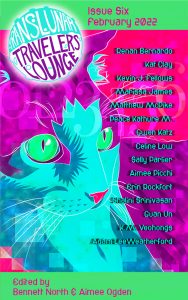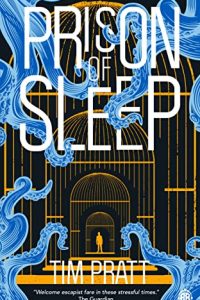Karen Burnham Reviews Short Fiction:Slate Future Tense, Translunar Travelers Lounge, and The Sunday Morning Transport
 Slate Future Tense 1/22
Slate Future Tense 1/22
Translunar Traveler’s Lounge 2/22
The Sunday Morning Transport 1/30, 2/6, 2/13, 2/27/22
The January story in Slate Future Tense is “If We Make It Through This Alive” by A.T. Greenblatt. It’s a really cool story about three friends who enter a road race to try to make it across America, Pennsylvania to California, in a post-collapse future. Crumbled infrastructure is only the start of their worries, and we get sections from each of the women’s perspectives, learning about their motivations and what keeps them going on such a wild quest. It’s a great balance of plot, worldbuilding, and character. The response essay, by Damien Williams, highlights the resourcefulness and adaptivity found in the disability community, which might position them better than average in a world no longer designed for anybody, abled or not.
Translunar Traveler’s Lounge has 14 stories in its sixth issue, out in February. It features a wide variety of authors, including some new on the scene. One of the strongest is from new-to-me author, Celine Low. “The God They Prayed To” is told from the perspective of a statue that a family has prayed to over multiple generations. While it was immobile, it certainly developed opinions about those surrounding it. Then comes Xue, a child living brightly but doomed to a short existence due to disease. When Xue knocks over the statue, its perspective necessarily shifts and we get a narration of an existential process I’d never encountered before. The language is quite beautiful. In contrast to that almost transcendent tale, “The Whittler” by Renan Bernardo is a particularly dark story imaging the Shapesayers, completely under the control of the titular character as she carves names and words into their bodies. She is particularly cruel, forcing POV character Jasmya to unspeak her own lover. She forces the Shapesayers to make her a partner, but making that request to a community that loathes you might leave one vulnerable. Then in “The War in Apartment 15” by Shalini Srinivasan we get the surreal perspective of an underpaid workman as the titular apartment is torn apart by not only the war that seems contained within it, but also by the meetings of the residents surrounding it.
Several of the stories here have fun premises executed with fairly light touches. “Hollywood’s Favorite Abductee” by Kat Clay turns the tables as a scream queen’s movie set is invaded by aliens who, in good Galaxy Quest style, have trouble telling our fiction from fact. Myra has to barge her way onto their spaceship to rescue the actor who they believe is the president. Guan Un brings us the “Rider Reviews for FerrymanCharon” which includes not only the Yelp-style reviews of the plyer of the River Styx, but also the responses from management. “For Sale: One Unicorn Saddle, Mostly Disenchanted” by Aimee Picchi is a lovely story of a girl who puts her unicorn saddle up for sale after her parents tell her that her beloved unicorn chose to leave when she went to summer camp. The listing evolves as she responds to online comments and questions. “Oil Bugs” by Gwen C. Katz is a story featuring more schadenfreude than average. It’s told via recovered emails between an oil company CEO and a marketing guy as genetically engineered oil-eating bacteria first save their bacon from an oil spill, then collapse everything by escaping into the wild. “French Press” by Marissa James & her late brother Matthew McPike imagines Princess Andalusia, who appears to be making coffee for a particularly picky Lord. There’s a fun twist to the ending that I shall not spoil. And “The Last Report” by Kevin J. Fallows seems to be born from the frustration of white-collar gig work. Betto (they/them) gets hit with a last minute impossible task from the “collab” software used by their company, and ends up using the task tracking AI to torch everything. There’s more than a hint of wish fulfilment to be found here.
Keeping an eye on new venue The Sunday Morning Transport, a particular style seems to be emerging. We see stories with weighty themes handled deftly and poetically in quite short pieces. You can see this in “Telling the Bees” by Kat Howard, in which a witch woman is part of her bee community. But when her lover turns nasty, both to them and to her, she has to decide who to trust – and sometimes all your options are bad. In “Dark Space Species” by Tessa Gratton, Min is a “witch” escorting star sharks in a dark space tank to a new home, courtesy of the capitalists who are destroying their original home. This is the Anthropocene expanded out to space with an almost trippy concept. Then there’s “This Living Hand” by Marie Brennan, in which she focuses on Fanny Brawne, a real historical figure. She was the lover of John Keats, the poet who died young. Having seen what happened to Keats, Shelley, and Byron, she suspects that something supernatural is at work and tracks down a leannán sídhe. Fanny is no poet but instead her talent lies with the needle. The creature tempts her with visions of being a leader of fashion across the Western world. Will she give in to the muse? I loved the research that informs the story as well as Fanny’s acumen throughout. “Twilight of the Eudaemancers” by Elwin Cotman gets deep into the world of advertising. Felix, a Black man, is a eudaemancer (magic of happiness) who had been successful in the advertising world. Down on his luck, he’s now being invited to present, uncompensated, at gallery showings “for the exposure.” But things turn for him when a young Black design student recognizes him – and in their conversation even more disturbing details emerge among layers of class and race concerns.
Recommended Stories
“This Living Hand”, Marie Brennan (The Sunday Morning Transport 2/13/22)
“The God They Prayed To”, Celine Low (Translunar Traveler’s Lounge 2/22)
This review and more like it in the May 2022 issue of Locus.
 While you are here, please take a moment to support Locus with a one-time or recurring donation. We rely on reader donations to keep the magazine and site going, and would like to keep the site paywall free, but WE NEED YOUR FINANCIAL SUPPORT to continue quality coverage of the science fiction and fantasy field.
While you are here, please take a moment to support Locus with a one-time or recurring donation. We rely on reader donations to keep the magazine and site going, and would like to keep the site paywall free, but WE NEED YOUR FINANCIAL SUPPORT to continue quality coverage of the science fiction and fantasy field.
©Locus Magazine. Copyrighted material may not be republished without permission of LSFF.






